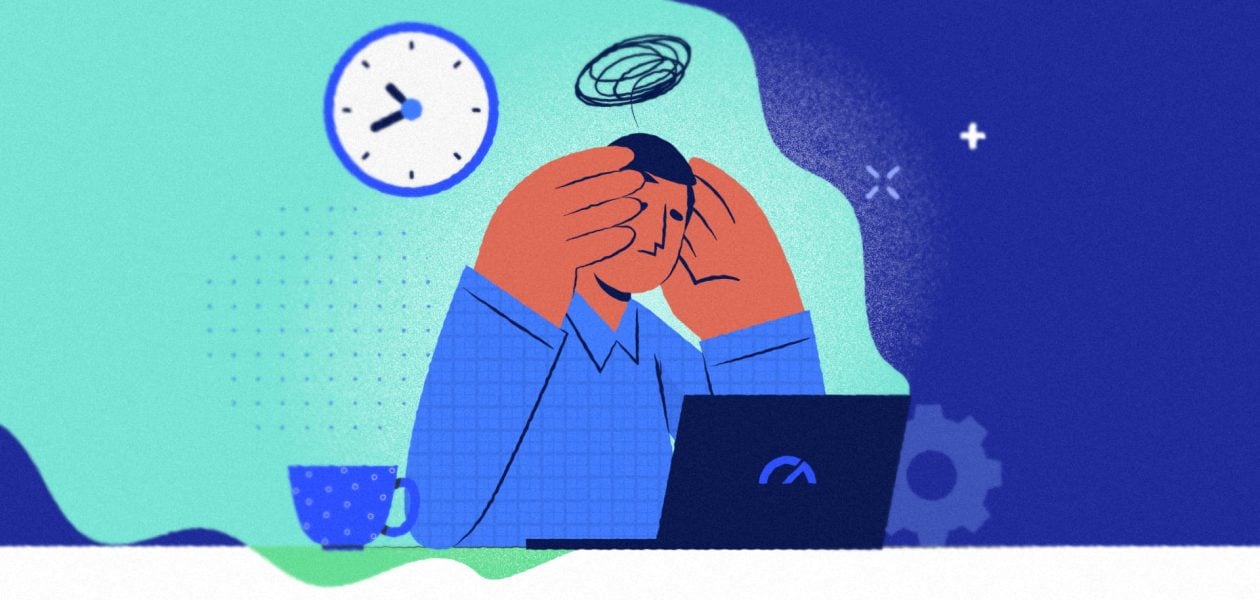Anxiety and productivity may appear to be an incompatible pair. How can someone be productive and effective while dealing with mental and emotional instability due to high stress?
Unfortunately, due to the side effects of 21st-century lifestyles, many of us are forced to deal with worry and productivity on a regular basis. Even people who usually complete a large number of their tasks quickly may occasionally feel as if the entire world is falling in on them and maybe quietly struggling with internal issues.
Psychotherapist Rachel Wright, M.A., L.M.F.T. mentioned in an interview that, now with the added stress of the coronavirus (COVID-19) pandemic—which has led millions of people around the world to work from home for the foreseeable future—these feelings of anxiety and isolation may become exacerbated for remote workers, particularly those who are new to the lifestyle
“There is going to be a massive shift in behavior, thoughts, and feelings,” adds Wright. Since we’re isolated, we need to figure out how to create connection within our physical disconnection.”
Whether you have racing thoughts or a paralyzing sense of terror, stress can have a massive impact on your regular work-life performance. Fortunately, anxiety and productivity can coexist with the correct approach, ideas, and habits. Continue reading for actionable tips on how to be productive while dealing with anxiety.
Table of contents
What is Anxiety?
Anxiety is a collection of anxious feelings about yourself or others, including nervousness, worry, and fear.
It can be triggered by events, such as sending your child to school for the first time or realizing you’re lost in a strange city.
It could also be a reaction to your thoughts about events that have already occurred or are imminent. That is why you find yourself concerned about whether you have offended someone recently or extremely worried about a big presentation at work that is still weeks away.
Symptoms of anxiety include sweating, trembling, nausea, and inability to sleep. The mental symptoms are likewise diverse, ranging from muddled thinking and facing difficulties in concentrating to hyper-active imagination and hyper-alertness on the other end of the spectrum. Anxiety is sometimes accompanied by erroneous sentiments of humiliation or shame.
Anxiety is an extremely prevalent issue. According to a 2017 American Psychiatric Association poll, nearly two-thirds of respondents were “very or moderately nervous” about their own and their families’ health and safety. And the World Health Organization estimated that more than 300 million people globally suffered from problematic anxiety in 2017.
How do you manage work Anxiety to boost productivity?
There are several ways for controlling anxiety symptoms. These can be helpful when you are experiencing anxiety attacks at work or at home, or when you are comforting particular challenges. Here are six strategies to help you overcome anxiety and supercharge your productivity:
Practice self-care regularly—not just in times of stress 🌞
Buffer’s 2019 State of Remote Work research surveyed nearly 2,500 remote employees from around the world about the benefits and drawbacks of working from home. While many highlighted the benefits of their flexible schedule, 22% of respondents reported having problems unplugging after work, 19% reported experiencing loneliness, and 8% reported having difficulty staying motivated.
Naturally, individuals can struggle with work-life balance and motivation for a variety of reasons. Regardless, self-care (or a lack thereof) can play a significant role, particularly for remote workers, according to Cheri McDonald, Ph.D., L.M.F.T., an expert in complex trauma and post-traumatic stress disorder (PTSD).
Consider the following:
For the majority of people, the 9-5 workday gives structure. You arrive at the office at a specific hour, complete your task, and then leave. However, McDonald notes that when you work from home, the framework is mostly determined by you. For the most part, you determine when to clock in and out and when to practice self-care.
Therefore, how can you establish a system that leaves room for both work and self-care? For starters, keep in mind that self-care is not something you do simply when you’re worried; self-care involves making the conscious decision to invest in yourself on a daily basis, as McDonald explains.
“Begin by selecting an activity that you like in all areas of self-care,” McDonald says. “Consider ahead of time the simplest method for you to feel well, nurtured, and cared for in your current position.”
For instance, a regular mindfulness practice — even if it is as simple as a daily five-minute prayer, breathing exercise, or meditation — can be used to provide self-care. Or maybe, you may feel refreshed after engaging your brain with a crossword problem during lunch. Perhaps a morning phone call or text from a loved one motivates you to face the day. Whatever self-care looks like for you, McDonald emphasizes the importance of routinely showing up for yourself, not just for your career.
“You can only give what you receive,”
Cheri McDonald, Ph.D., L.M.F.T.
Eat the right food 🍚
Diet is a necessary part of our daily life and can play a big role in reducing anxiety and boosting productivity. From the first cup of coffee in the morning to the final late-night snack, we’re always consuming food to maintain our energy levels or to relish our favorite cuisines.
However, what we consume has an effect on our mood. While diets high in refined sugar, carbohydrates, and fats may worsen anxiety symptoms, choosing healthier alternatives can help you be more productive while dealing with anxiety.
You do not have to make these changes all at once. Start slowly and work your way up with these anxiety-reducing healthy habits:
Drink water 💧
Drinking water keeps you hydrated, which can have a positive effect on your mood and leave you feeling energized and motivated. Start by substituting your post-lunch soda with a cold glass of water.
If you don’t like drinking water try adding some fruit flavors to keep things interesting. This adds taste and a healthy dose of vitamins to your beverage.
Additionally, if you’re having difficulty drinking enough water, try water reminder apps. There are numerous options to suit every taste — gamified apps, simple reminders, and water alarms, to name a few.
Limit your caffeine intake ☕
Caffeine drinks may increase your alertness. They can, however, make you twitchy and brimming with nervous energy, which actually worsens your anxiety symptoms and impairs your productivity.
Try substituting your daily coffee for a fruit smoothie or herbal tea and you’ll notice that caffeine consumption is more of a habit than a necessity.
Consume well-balanced, healthy meals 🍉
It’s vital to fuel your body with nutritious foods, but it’s particularly important while you’re struggling with worry. Choose lean meat or fish, fruits, veggies, and healthy grains to ensure you have enough energy to stay focused all day.
Whole, unprocessed foods are high in fiber and vitamins, and they assist to keep blood sugar levels stable, which is important for managing anxiety and being productive.
Maintain your morning routine 🌄
When you work from home, it’s tempting to get out of bed and immediately head to your computer, PJs and all, to start the workday. However, Psychotherapist Rachel Wright notes that keeping order, particularly in the mornings, can go a long way toward helping you feel calm, collected, and productive.
“Routine helps you maintain a sense of stability,” she explains. “Structuring your life with a sense of purpose and normalcy might help you feel anchored and prepare your brain to deal with all of the other unknowns.”
Therefore, when your alarm sounds, begin your day exactly as you would do if you were physically heading into the office: wake up on time, shower, eat breakfast, and dress. Nobody is requiring you to wear a stuffy suit or uncomfortable formal pants all day—you are not even required to wear jeans if you do not choose to. Rather than that, opt for some WFH-approved loungewear that is both comfortable and does not make you feel like a hot mess.
Be active! 🏃♀️
Research suggests that activity affects your mood positively and that it can help prevent and deal with anxiety.
Stretch 💪
Mental anxiety causes muscle tightness, which can be easily relieved with simple a good-old stretch. There are numerous stretching exercises that you can do while sitting at your desk at work. Alternatively, if you want to feel more at ease try exercising outside, keep a mat in your car for a fast yoga session during your lunch break.
Step away from your desk 🙅♂️
Taking a five- to ten-minute break from your desk every hour allows you to refocus and arrange your ideas. It’s especially helpful for people who are constantly restless all the time — breaks provide an opportunity to stretch your legs, brew a cup of tea, and get your blood flowing.
Aerobic exercise for anxiety and productivity 🤸♀️
Stress at work does not necessarily disappear after you leave work. According to researchers, as little as five minutes of aerobic exercise can provide anti-anxiety effects. If you’re exhausted or lacking inspiration, exercise with a friend to hold yourself accountable and make the time more fun.
While it may be tempting to lay down on the couch after a long and stressful day at work, going for a quick walk or run will be far more beneficial to reducing your anxiety and revamping productivity.
Plan ahead 📅
Having a daily plan or a strategy for work and projects helps you stay focused and visualizes everything that needs to be accomplished. Organizing your work – whether it is trying out a new morning routine or rearranging your workplace layout – helps maximize your day and gives you a more positive attitude.
Here are some planning tips for reducing anxiety and increasing productivity:
Use to-do lists 📃
To-do lists can help you keep up with tasks. At the start of the day, prepare a concise list of your must-do things. Refer to your list throughout the day and mark off tasks as they are finished. At the end of the day, review your list and set priorities for the next day. This will help you concentrate on the appropriate things at the appropriate time.
Stay organized 📆
Cluttered, unorganized spaces can cause anxiety and impair focus, reducing your productivity. Therefore, one of the simplest productivity hacks is to maintain an organized workspace. Cleaning and organizing files and other items on your desk enables you to easily locate what you need to complete a task and move on to the next target.
Prioritize your tasks 🧮
Prioritizing assignments and activities can work wonders in terms of increasing productivity and decreasing anxiety. Once you’ve determined what you need to achieve for the day, prioritizing tasks allows you to complete critical responsibilities first. This gives you peace of mind by ensuring that all key tasks are completed early in the day, allowing you to maintain a positive mental state while remaining productive. Additionally, crossing items off the list visually demonstrates accomplishment, which further boosts motivation.
To know more about how to effectively plan and manage your calendar check out our other blog: Effective Calendar Management and Scheduling Tips
Summary
People who suffer from anxiety frequently experience symptoms in a self-perpetuating loop. Individuals with high-functioning anxiety are typically able to execute the majority of their everyday responsibilities without much difficulty. Nonetheless, they tend to struggle with lack of motivation, racing thoughts, emotions of failure, and a sense of being out of control.
Regaining control empowers those who live stressful lives or suffer from anxiety, making them more resilient and capable of coping with changes at work and home. Focusing on what you can control and taking charge by developing an action plan are the keys to managing anxiety that boosting your productivity.



